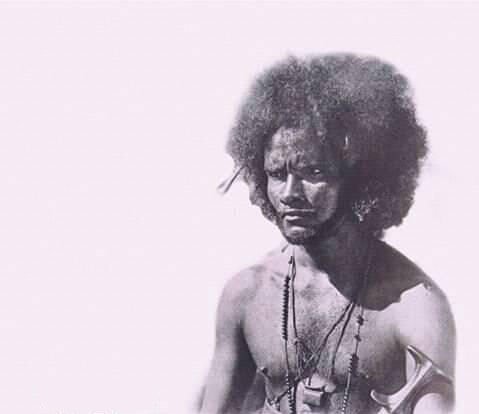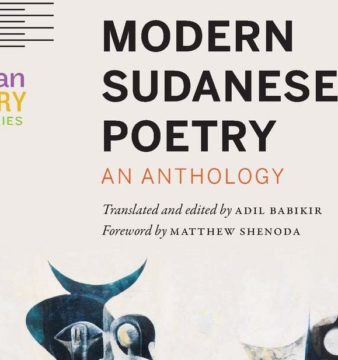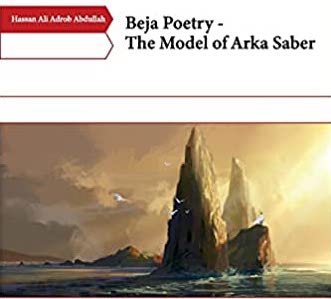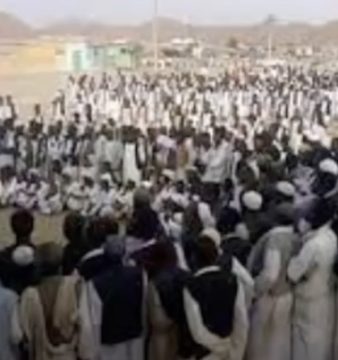A Look Into Rudyard Kipling’s Much-Celebrated “Fuzzy Wuzzy” Poem

“Fuzzy Wuzzy” is a historical poem that was written by the English novelist and poet Rudyard Kipling published in 1892 as part of Barrack Room Ballads. Kipling’s works include The Jungle Book and “The Man Who Would Be King”. However, “Fuzzy Wuzzy” is a nonfiction poem, which is a source of pride to many Sudanese as it appreciates the bravery of the Beja fighters in battles against the British army in the Battle of Tamai in 1884 and the Battle of Abu Klea in 1885. Kipling was the one who documented most of the Britain Empire’s victories and subsequently, won the Nobel Prize for Literature in 1907.
The poem first appeared in The Scots Observer’s weekly magazine, and then it was republished in Kipling’s book, Barrak Room Ballads, in March 1890. The term “Fuzzy Wuzzy” originally means “shaggy-haired” to denote the unique haircut of the Beja people and their distinctive hairstyles, but later when the British soldiers’ stigmatisation of disdainfully using it to describe Negroes, writers criticised its uses as they considered slanderous and racism.
Between 1883 AD and 1885 AD, eastern Sudan witnessed fierce battles between the British armies, equipped with the latest weapons of the time, led by their senior generals such as General Graham and the Beja revolutionaries, led by Prince Osman Digna, who were only equipped with faith in their cause and traditional weapons. They faced the British army in the battles of Tamia, Al-Tib , Sinkat, Toker, Sawakin and Arkawit with the presence of Kipling who participated in those battles and documented them in this poem.
This poem is presented from the perspective of the British infantry forces in their face-to-face combat with the Mahdist forces, and through it, Kipling described the English square tactics and strategies that failed to withstand in front of the Beja fighters. Not only did the Beja fighters defeat the British forces in battle, but also their impact was extended to the English army’s reputation as an empire on which the sun never sets. For this reason, in each stanza, Kipling praises their sudden attack, which lead to the victory of the Beja revolutionaries in battles.
This article recirculates as a result of the speech by the Sudanese Minister of Foreign Affairs, Dr Maryam Al Sadiq in Arkawit, eastern Sudan, in July 2021 in which she surprised the youth with historical information including names of several battles from which they only recognised the name of Prince Osman Diqna. Therefore, this article aims to clarify some of those battles and the valor of the Beja fighters on the battlefields by referring to the poem written by Kipling and its translation of Abdel Moneim Khojaly.
Text translation by: Abdel-Moneim Khalifa Khojali, Muscat: 1995
The structure of the poem
| الترجمة الى العربي | النص الانجليزي |
| لقد خبرنا الحرب مع رجال عديدين عبر بحار ممتدةكان بعضهم شجعانا بواسل وكان بعضهم غير ذلكمنهم البايثان والزولو والبورميونغير أن البجا كانوا أكثرهم روعةلم نجد منفذا لاختراق صفوفهم أبدابينما ظلوا يرمون خيلنا ويمزقون حراسنا في سواكنوكأنهم يلاعبون جندنا لعبة القطط الموسيقية | We’ve fought with many men acrost the seas,An’ some of ’em was brave an’ some was not:The Paythan an’ the Zulu an’ Burmese;But the Fuzzy was the finest o’ the lot.We never got a ha’porth’s change of ‘im:’E squatted in the scrub an’ ‘ocked our ‘orses,’E cut our sentries up at Suakim,An’ ‘e played the cat an’ banjo with our forces. |
| إنني أهدي إليكم أيها ” البجاويون” هذه الكلمات المخلصةتقديرا لكم في وطنكم السودانإنكم وان كنتم (بدائيون)غير أنكم ترتقون أعلى مرتبة يكون عليها المحاربونإننا نصدر لكم هذه البراءة شهادة حق وصدقوان رغبتم في أن تكون ممهورة بالتوقيعفنحن يشرفنا اللقاء بكم في الزمن الذي يروق لكم | So ‘ere’s to you, Fuzzy-Wuzzy, at your ‘ome in the Sudan;You’re a pore benighted ‘eathen but a first-class fightin’ man;We gives you your certificate, an’ if you want it signedWe’ll come an’ ‘ave a romp with you whenever you’reinclined. |
| قد عرفنا مفارقات ساحات الوغى في حربنا مع الكيبروتصدينا لسهام البوير الطائشة عبر المسافاتوارتعشنا عند ملاقاة البورميينولمسنا المهارة المتميزة التي يحارب بها الزولوغير أن كل هذا لم يكن سوى جعجعة ليست بذات أثرأمام إقدام وجسارة البجا | We took our chanst among the Khyber ‘ills,The Boers knocked us silly at a mile,The Burman give us Irriwaddy chills,An’ a Zulu impi dished us up in style:But all we ever got from such as theyWas pop to what the Fuzzy made us swaller; |
| لقد أشادت الصحف بتماسكناغير أن الحقيقة تظل دوماً باقية وناصعةوهي أنه في حرب الرجال للرجالقام البجا بدحرنا تماماًلكم أيها البجاويون ولأزواجكم وأبنائكم | We ‘eld our bloomin’ own, the papers say,But man for man the Fuzzy knocked us ‘oller.Then ‘ere’s to you, Fuzzy-Wuzzy, an’ the missis and the kid; |
| نعترف بأن التوجيهات كانت أن نقهركمولقد تحقق ذلك بفضل بنادق المارتينيالتي ظلت فوهاتها تقذف بالشرر نحو صدوركمفي معركة غير متكافئة وغير عادلةلكنكم رغم ذلك تمكنتم من اقتحام الصفوف | Our orders was to break you, an’ of course we went an’ did.We sloshed you with Martinis, an’ it wasn’t ‘ardly fair;But for all the odds agin’ you, Fuzzy-Wuz, you broke the square. |
| لم تحملوا أوراق هويةولم تزين صدوركم الأوسمة والنياشينوهذا يلقي علينا واجب أن نقوم نحن بالشهادة على البسالةوعلى براعة الحرب بالمهند ذي المقبضينوأنتم تصولون وتجولون وسط الأحراشحاملين رماحكم ودروعكم وأكفانكم | ‘E ‘asn’t got no papers of ‘is own,’E ‘asn’t got no medals nor rewards,So we must certify the skill ‘e’s shownIn usin’ of ‘is long two-‘anded swords:When ‘e’s ‘oppin’ in an’ out among the bushWith ‘is coffin-‘eaded shield an’ shovel-spear, |
| حقاً أن يوماً في المعركة مع البجاتظل سعادته باقية لعام | An ‘appy day with Fuzzy on the rushWill last an ‘ealthy Tommy for a year. |
| أيها البجاويونهذه القصيدة مهداة لكم ولمن رحل من أصدقائكموإن لم نكن نحن أيضاً قد فقدنا رفاقاًلعاوناكم على التأسيغير أن الحرب كر وفرسجال بين الأخذ والعطاء | So ‘ere’s to you, Fuzzy-Wuzzy, an’ your friends which are no more,If we ‘adn’t lost some messmates we would ‘elp you to deplore;But give an’ take’s the gospel, an’ we’ll call the bargain fair, |
| كانت معركة متوازنةفقدكم كان هو الأكبرغير أنكم نجحتم في بعثرة صفوفنا | For if you ‘ave lost more than us, you crumpled up the square! |
| هم هبوا نحو اللهيب المستعر والدخان المتصاعدوقبل ارتداد الطرف حلوا أمام وجوهناتنفذ منهم رائحة التراب والزنجبيلوبدت أجساد قتلاهممثل الزهور البريةوبدت كالبط وكالحملان ومثل عرائس المولد | ‘E rushes at the smoke when we let drive,An’, before we know, ‘e’s ‘ackin’ at our ‘ead;’E’s all ‘ot sand an’ ginger when alive,An’ ‘e’s generally shammin’ when ‘e’s dead.’E’s a daisy, ‘e’s a ducky, ‘e’s a lamb!’E’s a injia-rubber idiot on the spree,’E’s the on’y thing that doesn’t give a damnFor a Regiment o’ British Infantree! |
| لكم أيها البجاويون في وطنكم السودانلكم أيها (البدائيون) الذين تبوءوا أرقى مراتب المحاربينلكم أيها البجاويون يا أصحاب الهامات الشامخةلكم أيها الفقراء السود يا ذوي العزائم العاليةيا من نجحتم في كسر صفوف كتيبة بريطانية | So ‘ere’s to you, Fuzzy-Wuzzy, at your ‘ome in the Soudan;You’re a pore benighted ‘eathen but a first-class fightin’ man;An’ ‘ere’s to you, Fuzzy-Wuzzy, with your ‘ayrick ‘ead of ‘air –You big black boundin’ beggar — for you broke a British square |
Text translation by Abdel-Moneim Khalifa Khojali, Muscat: 1995
Text translation http://amoneim.blogspot.com/2009/07/blog-post_2266.html
Literary appreciation
In the last four lines of the first stanza, the poet presents examples of the Beja fighters courage and how they persevered, as well as the way they tore up the guards in Sawakin to penetrate their ranks.
Although the Beja were less equipped with weapons, they were, according to Kipling, “first-class” strong fighters. Therefore, he advised that the Beja fighters, who participated in those battles, should be divided among the British soldiers, who were marked on two levels and were given certificates at each level, with a certificate of qualification of a first-class fighter because of their military skills. Kipling said, “If they would like to sign these certificates by the competent authorities in the British army, the spokesman for the Beja forces can arrange for that with them.”
Kipling concluded his poem with what was reported by some official British newspapers with some incorrect information about the reality of the battles against the Beja and their neutrality from the truth. Instead he confirmed that Fuzzy Wuzzy completely hit the British army in their strongholds. In an explicit text, he said, “They beat them even though they had few military resources.”
“Fuzzy Wuzzy” is considered as a historical reference to the courageous Beja fighters – a story that’s annually celebrated and commemorated. It’s a reference to the war tactics the Beja fighters used, which were praised by the Generals of the Great Empire, and are taught in military colleges to this day. For younger generations, it teaches them of the values and meanings of sacrifice – which resulted in a huge number of martyrs for the unity of Sudan – and the sincere patriotic spirit that distinguished the fighters in confronting invading forces.
The poem should be included at the beginning of every academic book alongside the national anthem in all academic stages as it was written by the greatest poets of the most powerful empires of the 19th century.
The understanding of Kipling’s poem and its status has led to appreciation of the Beja fighters’ role in eastern Sudan. Regardless, many Sudanese university graduates of history had not been taught the poem or of its significance – many of who came across the poem through other means were surprised why such important poem was not included in the Sudanese curricula.
The Ministry of Education should include the rich history of the Beja fighters or Fuzzy Wuzzy into the major academic subjects whether in Arabic or English texts. Moreover, it can be a linguistic and literary subject for university levels especially for those who intend to study English language, because it does not require any examination or scrutiny as it is already set in volumes of British history in Africa and it appeared in their films. In addition, these films should be shown to the Sudanese public and specialised local TV and media channels to highlight the significant role of the Fuzzy Wuzzy during colonisation in the 19th century. They are a national pride.

Dr Hassan Adrob is a Sudanese based in Oman and works as an English language and Linguistic lecturer and a teacher trainer at Red Sea University and Sohar University. His MA and PhD are in Applied Linguistics. Dr Hassan is a qualified CELTA instructor and has participated in an accredited IELTS Training Programme. He fulfilled the twin duties of lecturer in English and skills leader. Dr Hassan is a regular participant at conferences and has recently published three books with Eliva Press.




